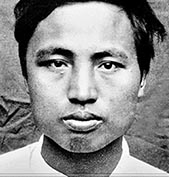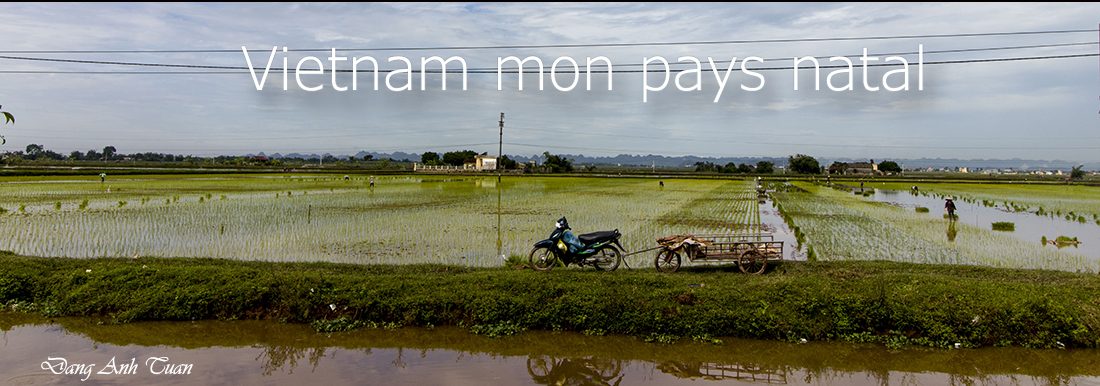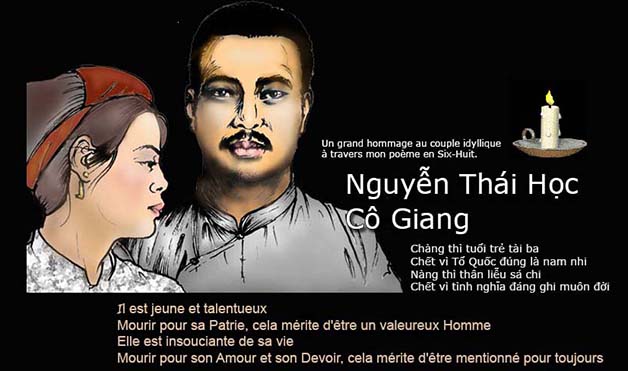A great homage to the idyllic couple through my poem in Six-Eight:
He is young and talented;
Dying for his Father Land, he deserves being a valorous man.
She does not worry about her own life;
Dying for her love and duty, she is unforgettable forever.
Contrary to other Vietnamese towns, Yên Bái has no tourist attractions. It is only the provincial capital, a riverside town located in the valley of the Red river half way on the road going from Hànội to the Chinese border Lào Cai. In spite of that, it continues to be famous in the past by its armed resistance driven by Vietnamese nationalists in the struggle for independence. It incarnates not only the hope of the Vietnamese people to regain their freedom by force but also the dauntlessness of the nationalists before death after the failure of their revolt in 1930. It should be looked at in the political context of that time to understand not only the causes of that revolt but also the Vietnamese people’s profound aspiration for independence after Phan Chu Trinh ‘s failure in advocating priority of overall progress of society over political independence followed by his death, and the house arrest of Phan Bội Châu, another important figure, by the colonial authorities at the capital of Huế.
Despite the warning of colonel Parfait-Louis Monteil in 1924, few reforms were made in favor of the native people. On the contrary, the exploitation of cheap labor in rubber tree plantations was at the top of its efficiency and horror. Writer Roland Dorgelès talked about it in his work « The Mandarin Road« . This virgin land, when it opens on impact, releases a mortal breath. As many as traced paths, as many as open tombs. The rubber trees coming out of the ground, spindly, and well in lines, look like the rows of cross. The dead numbered in the tens of thousand because of diseases and malnutrition. That is why through the following poem, this complaint is heard:
Kiếp phu đỗ lắm máu đào
Máu loang mặt đất máu trào mủ cây
Trần gian địa ngục là đây
Ðồn điền đất đỏ nơi Tây giết người
The coolies’ blood has much shed,
It shed on the ground, it shed through the sap.
This is the hell on earth,
The rubber tree plantation is where the French colonists commit murder.
For half of a century, the colonists harvested latex they converted into gold. It was in the plantations that sprouted the revolt. Someone like Nguyễn Văn Viên arrived at getting out of this hell and joining the Vietnamese nationalist party ( Việt Nam Quốc Dân Ðảng ) led by Nguyễn Thái Học. To show this fervor and find a favorable echo among the deprived, especially the plantation coolies, Nguyễn Văn Viên took the initiative, in spite of Nguyễn Thái Học’s reluctance, to assassinate Bazin known for his opulence in recruiting coolies and shipping them to rubber tree plantations in South Vietnam. The death of this man gave the colonial authorities an opportunity to launch the policy of repression all over the place.
Thus the nationalist party became the favored target in this crusade. It could no longer move easily. If it did not react, it would be a slow death because its members would be captured sooner or later by the colonial authorities. If it did react by the revolt, it knew that it would be a collective, hazardous, and exemplary suicide. That is why Nguyễn Thái Học had the habit of saying to his party companions:
Ðại hà chi thanh, nhân thọ kỷ hà?
Ðợi sông Hoàng Hà trong trở lại, đời người thọ là bao?
Waiting for the Yellow River water to be clear, how many live spans can we count?
The real photo of Nguyễn Thái Học
According to the Chinese, the Yellow River water only regains its clearness every three hundred years. Nguyen Thai Hoc knew for sure he was going to lead his party companions to a definite death. He could not wait any longer. But this death seemed useful because it recalled to the Vietnamese people that there was no other choice but the struggle. It also marked the beginning of an awareness and awakening of the whole people facing its destiny that was, up until then, led by the unworthy heirs of the Nguyễn dynasty (Khải Ðịnh, Bảo Ðại). The revolt of Yên Bái was an indisputable failure because most of the nationalists leaders were captured.
On the other hand, it threw in a sound and long lasting basis upon which the communist party laid its authority and popularity among the people in the following years in the conquest of independence. It also tolled the death knell for a colonial empire that had vainly lost so many opportunities to reestablish the dialogue and cooperation with the native people. This was translated by the death sentence imposed on all the nationalist leaders. Nguyễn Thái Học was the last one to be guillotined. Before his execution, he was impassible. In spite of his weakness, he tried to shout out loud in French:
Dying for one’s country
Is the most beautiful fate
The most envied lot….
Then he lay down on his back facing the blade of the guillotine. « Long live Vietnam » was the last words heard before the fall of the guillotine’s blade. His blood spurted everywhere under a covered sky. His head fell in a bucket containing saw dust (June 17 1930). He was only 27. Faithful to her Vietnamese tradition, his wife Nguyễn Thị Giang did not take long to follow him to commit suicide on June 18, 1930 at the inn where they had met often before their marriage. She left a letter whose sentences illustrated well the indefectible love she had for her husband and her country:
Sống nhục sao bằng sự thoát vinh
Nước non vẹn kiếp chung tình
………
Cuộc đời xá kể chi thành bại
Trai trung thì gái phải trinh
Dying in pride rather than living in humiliation
I make it whole the love for you and the nation
……..
Success and failure do not matter in life
As long as man is faithful and woman has fidelity.
The remains of the thirteen Vietnamese nationalists were buried the following day on a hill near the Yên Bái railway station.
If this town is not as well known as most of Vietnamese cities, it incarnates on the contrary something the other towns cannot have. It is the symbol of maturity and dignity rediscovered in a people facing its own fate. It grew valiantly in the past along with the Vietnamese people in its struggle for independence.
(Việt Nam Quốc Dân Ðảng)

